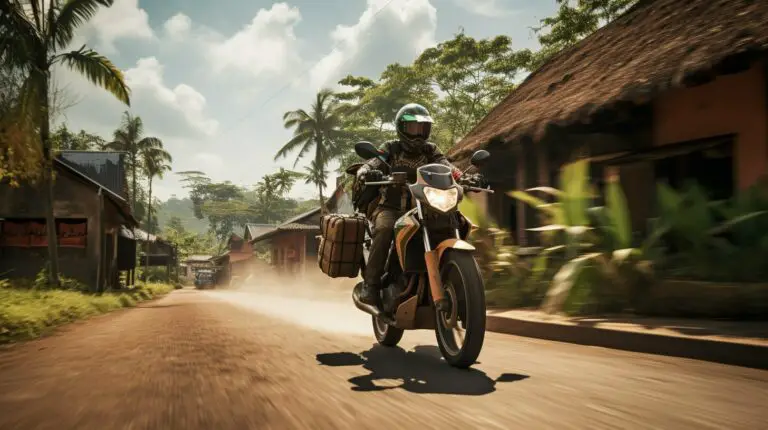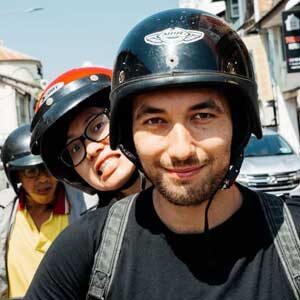Embark on an epic adventure with these 20 essential tips and laws to know before your motorcycle trip in Indonesia. Whether you’re a seasoned rider or a first-time explorer, being prepared is the key to a safe and memorable journey through this stunning archipelago. From choosing the right season to understanding local customs and regulations, we’ve got you covered with everything you need to know before hitting the road.
Key Takeaways:
- Pick the best season to visit Indonesia to avoid heavy rains.
- Ensure you have the right visa for your stay.
- Learn some basic phrases in Bahasa Indonesia to enhance your experience.
- Pack appropriate clothing for the tropical weather.
- Get a local SIM card and download useful apps for navigation.
Embarking on a motorcycle trip in Indonesia is an opportunity to discover breathtaking landscapes, vibrant cultures, and the thrill of the open road. However, it’s important to be well-prepared to ensure a safe and enjoyable experience. By following these tips and laws, you’ll be fully equipped to make the most of your adventure while respecting local customs and staying informed about potential risks. So gear up, embrace the freedom of the open road, and get ready to create unforgettable memories in Indonesia.
Choosing the Right Season for Your Trip
Planning your motorcycle trip in Indonesia starts with choosing the right season to ensure a smooth and enjoyable journey. The country’s tropical climate means that the weather can vary significantly throughout the year, so it’s important to be well-prepared before embarking on your adventure.
If you’re looking to explore Indonesia by motorcycle, it’s best to avoid the heavy rainy season, which typically occurs from November to March. During this time, certain areas of the country experience monsoons and heavy rainfall, which can make riding conditions challenging and potentially dangerous.
On the other hand, the dry season, which runs from April to October, offers better weather for motorcycle trips. The skies are generally clear, and you can expect warm temperatures and minimal rainfall. However, it’s worth noting that some regions in Indonesia, such as Sumatra and Papua, have their own unique climate patterns, so it’s essential to research specific locations within the country to ensure you choose the best time to visit.
| Season | Timeframe | Weather |
|---|---|---|
| Dry Season | April to October | Clear skies, warm temperatures, minimal rainfall |
| Rainy Season | November to March | Monsoons, heavy rainfall |
By carefully selecting the season for your motorcycle trip in Indonesia, you can make the most of your adventure and ensure a safe and enjoyable experience. Remember to check the weather forecasts and plan your route accordingly, taking into account any regional variations in climate. Whether you’re exploring the stunning beaches of Bali, the cultural wonders of Yogyakarta, or the scenic landscapes of Java, knowing the best time to visit will contribute to a memorable journey in this diverse and enchanting country.
Visa Requirements for Your Stay
Before setting off on your motorcycle trip to Indonesia, make sure you have the appropriate visa to avoid any legal complications. The visa requirements for entering Indonesia can vary depending on your nationality and the purpose of your visit. It is important to research and understand the specific visa regulations that apply to your situation.
For most travelers, a tourist visa can be obtained upon arrival at the major international airports in Indonesia. This visa allows for a stay of up to 30 days and is extendable for an additional 30 days. However, if you plan to stay longer or engage in activities other than tourism, you may need to apply for a different type of visa.
It is crucial to check the latest information regarding visa requirements as they can change frequently. The Indonesian Embassy or Consulate in your home country should provide up-to-date information on the necessary documents, fees, and application process. It is recommended to apply for your visa well in advance of your trip to ensure a smooth and hassle-free entry into Indonesia.
Table: Visa Types and Requirements
| Visa Type | Duration of Stay | Requirements |
|---|---|---|
| Tourist Visa | Up to 30 days | Valid passport, return ticket, proof of sufficient funds |
| Business Visa | Up to 60 days | Valid passport, invitation letter from Indonesian company, proof of business activities |
| Social/Cultural Visa | Up to 60 days | Valid passport, sponsorship letter from Indonesian organization, purpose of visit |
| Work Visa | Dependent on employment contract | Valid passport, work permit, sponsorship from Indonesian employer |
Remember to check the visa requirements for any countries you plan to visit during your motorcycle trip as well. Some neighboring countries may have different entry and exit regulations, and you may need to apply for additional visas or permits. It is always better to be well-informed and prepared to ensure a smooth and enjoyable journey through Indonesia.
Familiarize Yourself with the Language
While English is widely spoken in tourist areas, knowing a few words of Bahasa Indonesia can go a long way in connecting with locals during your motorcycle trip. Learning some basic phrases and greetings will show respect for the local culture and make your interactions more meaningful. Here are a few essential words and phrases to get you started:
| English | Bahasa Indonesia |
|---|---|
| Hello | Halo |
| Thank you | Terima kasih |
| Excuse me | Permisi |
| How much? | Berapa harganya? |
| Where is… | Di mana… |
Using these simple phrases will help you navigate local markets, ask for directions, and engage in friendly conversations. The locals will appreciate your efforts, and it will enhance your overall experience of Indonesia. Additionally, carrying a pocket-sized English-Bahasa Indonesia phrasebook can be handy for more complex conversations.
Etiquette and Cultural Tips
In addition to learning the language, it’s important to familiarize yourself with the local customs and cultural practices. Here are a few tips to help you navigate Indonesian culture:
- Remove your shoes when entering someone’s home or places of worship.
- It is considered impolite to point with your index finger, instead, use your thumb.
- Avoid public displays of affection, as it is not common practice.
- Always use your right hand for giving and receiving objects, as the left hand is considered unclean.
- Show respect for the elderly by using formal language and addressing them with the appropriate honorifics.
By familiarizing yourself with the language and cultural norms, you’ll not only make meaningful connections with the locals but also show respect for their customs and traditions. This will enrich your motorcycle trip experience and leave a positive impression on the communities you visit.
Packing Essentials for the Tropical Weather
When packing for your motorcycle trip in Indonesia, keep in mind the tropical weather and ensure you have the necessary essentials to stay comfortable. The country’s warm and humid climate requires lightweight and breathable clothing to help you stay cool. Here are some packing tips to help you prepare:
Clothing
Opt for lightweight, moisture-wicking fabrics such as cotton or linen. Pack comfortable and casual clothing like t-shirts, shorts, and skirts. Don’t forget to bring a swimsuit for beach visits. Additionally, it’s advisable to pack a long-sleeved shirt and pants for highland areas where it can get cooler in the evenings.
Protective Gear
While riding a motorcycle, safety should always be a priority. Make sure to pack a good quality helmet that fits properly. Sunglasses and a bandana or scarf will protect your eyes and face from dust and sun exposure. Don’t forget to bring sunscreen with a high SPF to shield your skin from the intense tropical sun.
Essentials
In addition to clothing and protective gear, there are some essential items that you should pack. A lightweight rain jacket or poncho will come in handy during unexpected rain showers. Bring insect repellent to protect yourself from mosquitoes and other insects. It’s also a good idea to have a small medical kit with basic first aid supplies, including any necessary prescription medications.
| Essentials Checklist |
|---|
| Lightweight and breathable clothing |
| Long-sleeved shirt and pants for cooler areas |
| Comfortable footwear for walking and exploring |
| Swimsuit |
| Helmet |
| Sunglasses and bandana/scarf |
| Sunscreen with high SPF |
| Lightweight rain jacket or poncho |
| Insect repellent |
| Basic first aid kit |
By considering the tropical weather when packing for your motorcycle trip in Indonesia and having these essentials with you, you’ll be well-prepared to enjoy your adventure in this beautiful country.
Navigating with Local SIM Cards and Apps
Staying connected and navigating through Indonesia becomes easier with a local SIM card and handy apps at your disposal. Whether you need to find your way to a hidden beach, discover local attractions, or book accommodations on the go, having a local SIM card and useful apps can greatly enhance your motorcycle trip experience.
When you arrive in Indonesia, make sure to purchase a local SIM card. This will allow you to have a reliable internet connection throughout your journey, enabling you to access online maps, communicate with locals, and stay connected with loved ones back home. Local providers like Telkomsel, XL Axiata, and Indosat offer a range of affordable data plans that cater to different needs and durations of stay.
Once you have your local SIM card activated, don’t forget to download useful apps like Grab and Gojek. These ride-hailing apps are popular in Indonesia and can be a lifesaver when you need a quick and convenient way to get around. Not only can you order a motorcycle taxi, also known as ojek, from these apps, but you can also use them to order food delivery, book a car ride, or even buy groceries from local stores. These apps are user-friendly and widely used in major cities across the country, ensuring a hassle-free experience during your motorcycle trip.
| Benefits of Local SIM Cards and Apps for Your Motorcycle Trip |
|---|
| 1. Navigation: With a local SIM card and apps like Grab and Gojek, you can easily navigate through unfamiliar roads and find your way to your desired destinations. |
| 2. Communication: Having a local SIM card allows you to communicate with locals, seek assistance when needed, and stay connected with your fellow motorcycle travelers. |
| 3. Convenience: Using local apps for transportation, food delivery, and other services provides convenience and saves you time and effort during your motorcycle trip. |
Respecting Local Customs and Traditions
As a responsible traveler, it is essential to respect and appreciate the cultural practices and customs of the diverse communities in Indonesia. By following a few simple guidelines, you can ensure that your motorcycle trip in Indonesia is not only enjoyable but also respectful of the local culture. Here are some tips to help you navigate the customs and traditions of this beautiful country.
1. Embrace the Local Etiquette
Indonesians place great value on politeness and humility. When interacting with locals, it is important to greet them with a smile and a respectful nod. Be mindful of your body language and avoid using gestures that may be considered offensive. Remember to always use your right hand when giving or receiving objects, as the left hand is traditionally seen as unclean.
2. Dress Appropriately
Indonesia is a predominantly Muslim country, and modesty is highly valued. While it is acceptable to wear more casual clothing in tourist areas, it is important to dress modestly when visiting religious sites or rural communities. Both men and women should avoid wearing revealing clothing, and women may be required to cover their shoulders and knees.
3. Show Respect in Religious Sites
Indonesia is home to a rich tapestry of religious beliefs, including Islam, Hinduism, Buddhism, and Christianity. When visiting temples, mosques, or any other religious sites, remember to dress modestly, remove your shoes before entering, and be respectful of any ceremonies or rituals taking place. Taking photos may be restricted in some areas, so always ask for permission first.
| Customs | Respecting the Local Culture |
|---|---|
| 1. | Learn a few basic phrases in Bahasa Indonesia to show your respect and interest in the local language. |
| 2. | Avoid public displays of affection, as it may be considered inappropriate in certain communities. |
| 3. | Always ask for permission before taking someone’s photo, especially if it involves children. |
| 4. | Respect sacred sites and artifacts by not touching or removing anything. |
| 5. | Follow the local customs when eating, such as using your right hand for meals or not pointing with your fingers. |
By following these tips, you can ensure that your motorcycle trip in Indonesia is not only memorable but also respectful of the local customs and traditions. Embracing the diversity of the country and showing respect for its culture will not only enhance your experience but also leave a positive impact on the communities you encounter along the way.
Being Aware of Potential Scams and Safety Risks
While Indonesia is generally a safe country to explore, it’s important to be cautious and knowledgeable about common scams and safety risks. Here are some key things to keep in mind to ensure a safe and enjoyable motorcycle trip in Indonesia:
- Beware of pickpocketing in crowded areas such as bars and marketplaces. Keep your valuables secure and avoid displaying expensive items.
- Be cautious of fraudulent tour operators or individuals offering deals that seem too good to be true. Always research and choose reputable providers.
- Avoid sharing personal information, such as your travel plans or accommodation details, with strangers. It’s always better to err on the side of caution.
- Stay updated on the latest travel advisories and follow any safety warnings or restrictions in place, especially in regions prone to natural disasters like volcanoes and earthquakes.
- When renting a motorcycle, thoroughly inspect the bike for any damages before signing any agreements. Take pictures or video evidence if necessary to avoid potential disputes later on.
Common Scams to Watch Out For
While scams can occur anywhere, being aware of common ones in Indonesia can help you avoid falling victim. Here are a few scams that travelers have encountered:
| Scam | Description |
|---|---|
| The Fake Police Officer | Someone posing as a police officer may approach you, claiming there is an issue with your documents or vehicle and demanding a bribe. Always ask for proper identification and insist on going to the nearest police station to resolve any issues. |
| The Overpriced Souvenir | Some souvenir sellers may try to overcharge tourists or sell counterfeit items. Compare prices in different shops and be wary of deals that seem too good to be true. |
| The Tourist Taxi Racket | Unlicensed taxi drivers may approach tourists at airports or popular tourist spots, offering transportation at inflated prices. Always use registered taxis or reputable ride-hailing services to ensure your safety and avoid being overcharged. |
By staying informed and exercising caution, you can minimize the risks and enjoy a safe and memorable motorcycle trip in Indonesia. Remember to prioritize your safety, follow local laws and regulations, and trust your instincts when encountering unfamiliar situations.
Understanding Local Laws and Regulations
To ensure a smooth and lawful motorcycle trip in Indonesia, it’s crucial to have a good understanding of the local laws and regulations. Being aware of the legal framework will not only help you avoid unnecessary fines or legal troubles but also contribute to a respectful and responsible travel experience.
Here are some important laws and regulations to keep in mind:
- Traffic Rules: Familiarize yourself with the traffic rules in Indonesia, such as speed limits, helmet requirements, and lane discipline. Adhering to these rules will help you stay safe and avoid any legal issues.
- Licensing: Make sure you have the appropriate motorcycle license for riding in Indonesia. International driving permits are generally recognized, but it’s always advisable to check the specific requirements beforehand.
- Vehicle Registration: If you’re bringing your own motorcycle to Indonesia, ensure you have all the necessary documentation, including proof of ownership, registration papers, and insurance. It’s essential to comply with the registration and insurance procedures to avoid any complications.
- Environmental Laws: Indonesia has strict environmental regulations, particularly for protected areas and national parks. Respect nature and wildlife by adhering to the designated trails and avoiding any activities that may harm the environment.
Remember, laws and regulations can vary across regions, so it’s important to research and understand the specific rules that apply to your intended travel destinations within Indonesia. By being well-informed and respectful of the local laws, you can enjoy a memorable and hassle-free motorcycle trip in this beautiful country.
| Laws and Regulations | Key Points |
|---|---|
| Traffic Rules | Observe speed limits, wear helmets, and follow lane discipline. |
| Licensing | Acquire the appropriate motorcycle license or an international driving permit. |
| Vehicle Registration | Carry all necessary documentation, including proof of ownership, registration papers, and insurance. |
| Environmental Laws | Respect protected areas and national parks, follow designated trails, and avoid activities that harm the environment. |
Safety Precautions for Riding in Indonesia
Prioritizing safety is essential when embarking on a motorcycle trip in Indonesia, and being aware of potential hazards and road conditions can help ensure a smooth journey. Here are some safety precautions to keep in mind:
1. Wear Protective Gear
Always wear a helmet that meets safety standards, as well as protective clothing, gloves, and sturdy shoes. This will minimize the risk of injury in case of an accident or fall.
2. Observe Traffic Rules
Be familiar with and adhere to local traffic rules. Pay attention to road signs, traffic signals, and speed limits. Stay in your lane, use indicators, and practice defensive driving to anticipate and avoid potential hazards.
3. Be Mindful of Road Conditions
Indonesian roads can vary greatly, from well-maintained highways to rough and potholed tracks. Be cautious when encountering uneven surfaces, gravel, or wet roads, as they can affect your bike’s stability. Slow down and adjust your riding style accordingly.
4. Stay Alert and Avoid Distractions
Keep your focus on the road at all times. Avoid using your phone, listening to loud music, or engaging in any activities that may distract you from riding safely. Stay aware of your surroundings and anticipate the actions of other road users.
By following these safety precautions, you can enjoy your motorcycle trip in Indonesia while minimizing the risks. Remember, your safety and the safety of others should always be a top priority.
Travel Insurance and Emergency Preparedness
Protect yourself and your motorcycle trip investment by having appropriate travel insurance and being prepared for any emergencies that may arise. Travel insurance is essential for ensuring that you have financial protection in case of accidents, injuries, or unforeseen circumstances during your motorcycle trip in Indonesia. It provides coverage for medical expenses, trip cancellations, lost or stolen belongings, and even emergency evacuations.
In addition to travel insurance, it is crucial to be prepared for emergencies. Research the contact information for local emergency services and have it readily available. Familiarize yourself with the nearest hospitals and clinics along your route. Carry a first aid kit with essentials like bandages, antiseptics, and any necessary medications.
It’s also a good idea to inform a family member or friend about your travel plans, itinerary, and emergency contact information. This way, someone back home will be aware of your whereabouts and can assist in case of an emergency.
| Emergency Contact Numbers | Important Documents to Carry |
|---|---|
|
|
By taking these precautions, you can have peace of mind knowing that you’re well-prepared for any potential emergencies during your motorcycle trip in Indonesia. Remember, safety should always be your top priority.
Are the Tips and Laws for a Motorcycle Trip in Kenya Similar to Those in Indonesia?
When planning a motorcycle trip in Kenya, it’s crucial to familiarize yourself with the motorcycle trip laws in kenya to ensure a smooth and enjoyable adventure. Similarly, if you are considering embarking on a motorcycle trip in Indonesia, it’s essential to educate yourself about the specific motorcycle trip laws in Indonesia. Understanding and following these laws will guarantee a safe and legal journey in both countries.
Are the Tips and Laws for Motorcycle Trips in Cambodia Applicable in Indonesia as Well?
When planning a motorcycle trip in Cambodia, it’s essential to know the top tips for motorcycle trip in cambodia. However, it’s important to note that while some of the laws and general tips may be applicable in Indonesia as well, each country has its unique traffic regulations and road conditions. Therefore, it’s advisable to research and familiarize yourself with the specific tips and laws for motorcycle trips in Indonesia before embarking on your journey.
Conclusion
By following these 20 essential tips and laws, you’ll be well-equipped to embark on a safe, lawful, and unforgettable motorcycle trip in Indonesia.
Before setting off, it’s crucial to choose the right season for your trip, ensuring that you avoid the heavy rains and can fully enjoy the beauty of Indonesia. Additionally, make sure to have the appropriate visa for your stay to avoid any complications or legal issues.
Familiarize yourself with Bahasa Indonesia, the local language, as it can greatly enhance your travel experience and help you communicate with the locals. Packing essentials for the tropical weather is also important, including cool clothing for lowland areas and a warm layer for highland regions.
Don’t forget to purchase a local SIM card and download useful apps like Grab and Gojek for easy navigation throughout your journey. Show respect for the customs and traditions of the local communities you encounter, as this will not only enrich your experience but also promote cultural understanding.
Staying safe is paramount, so be aware of potential scams and safety risks. Familiarize yourself with local laws and regulations, and always prioritize safety while riding your motorcycle. Consider obtaining travel insurance to ensure you’re protected in case of accidents or emergencies.
By following these guidelines and being prepared, you’ll be able to fully immerse yourself in the incredible beauty of Indonesia and create memories that will last a lifetime.
FAQ
Q: When is the best season to visit Indonesia for a motorcycle trip?
A: It is recommended to pick a season that avoids the heavy rains to make your motorcycle trip more enjoyable and safe.
Q: What visa do I need for my motorcycle trip in Indonesia?
A: Make sure to have the correct visa for your stay in Indonesia. Check with the Indonesian embassy or consulate in your country for the specific requirements.
Q: Is it important to learn some words in Bahasa Indonesia?
A: Yes, learning a few words in the local language, Bahasa Indonesia, can greatly enhance your motorcycle trip experience and help you communicate with locals.
Q: What should I pack for the tropical weather in Indonesia?
A: Pack casual and cool clothing suitable for the tropical weather, and also bring a warm layer for highland areas where it can get chilly.
Q: Should I get a local SIM card and download apps?
A: Yes, buying a local SIM card and uploading useful apps like Grab and Gojek can make navigation and communication easier during your motorcycle trip in Indonesia.
Q: How should I show respect for the religious beliefs of the locals?
A: It is important to respect the religious beliefs of the locals by dressing modestly, covering your shoulders and knees, and avoiding disrespectful behavior or gestures near religious sites.
Q: Why should I take off my shoes when entering a building or someone’s home?
A: Taking off your shoes before entering a building or someone’s home is a cultural norm and a sign of respect in Indonesian society.
Q: Are there any specific customs I should be aware of?
A: In traditional communities, it is considered taboo to ask elderly people their names, so it’s best to avoid this question to show respect.
Q: Should I bring a small gift when visiting a family home?
A: Yes, it is a nice gesture to offer a small gift, such as snacks or a souvenir from your home country, when visiting a family home in Indonesia.
Q: How can I avoid pickpocketing in crowded areas?
A: Stay alert and keep your belongings secure in crowded bars and marketplaces. Use a money belt or a cross-body bag and avoid displaying valuable items.
Q: Should I be prepared for volcanoes and earthquakes during my trip?
A: Yes, Indonesia is located in the Pacific Ring of Fire and is prone to volcanic eruptions and earthquakes. Stay updated on official advice and adhere to exclusion zones when necessary.
Q: What should LGBTQI+ travelers be aware of in Indonesia?
A: It is important for LGBTQI+ travelers to be aware of the laws and cultural attitudes towards homosexuality, especially in the province of Aceh where Sharia law is strictly enforced.
Q: Is it recommended to get travel insurance for my motorcycle trip in Indonesia?
A: Yes, it is highly recommended to have travel insurance that covers you in case of accidents or emergencies during your motorcycle trip in Indonesia.
Q: What do I need to know about border crossing regulations with my motorbike?
A: If you plan to take your motorbike into other countries like Cambodia or Vietnam, make sure to research and understand the specific border crossing regulations that allow entry with a motorbike.
Q: Are there any scams or corruption to be cautious of at border crossings?
A: Yes, be cautious of scams and corruption at border crossings between Laos and Cambodia. Be aware of your surroundings and follow official procedures.
Q: What are the registration and insurance procedures for taking my motorbike into Thailand?
A: Follow the correct registration and insurance procedures if you plan to take your motorbike into Thailand. Check with the local authorities for the specific requirements.
Q: How important is it to respect local customs and cultural practices?
A: Respecting local customs and cultural practices is essential to show appreciation for the local culture and to maintain positive interactions with the local community during your motorcycle trip in Indonesia.
Q: Should I familiarize myself with traffic rules and road conditions in Indonesia?
A: Absolutely. Familiarizing yourself with the traffic rules and being aware of the road conditions in Indonesia will contribute to a safer and more enjoyable motorcycle trip.
Q: What should be my top priority while riding my motorcycle in Indonesia?
A: Safety should always be your top priority. Follow local laws and regulations, wear protective gear, and maintain a cautious and defensive riding style.






